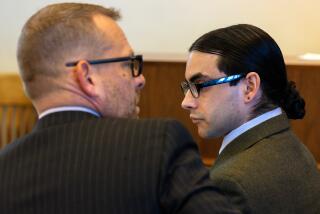Gov. Brown again denies parole for ex-Mexican Mafia killer Rene Enriquez
- Share via
Gov. Jerry Brown denied parole Thursday for former Mexican Mafia shot-caller Rene “Boxer” Enriquez, marking the third time that the governor has blocked the convicted killer’s bids for freedom.
In recent years, Enriquez, 55, disavowed his violent tenure with the Mexican Mafia and became a darling of law enforcement by cooperating with investigators, filming training videos and lecturing at conferences.
Brown commended Enriquez’s efforts at self-improvement and noted that prosecutors have praised his help, but ultimately decided Enriquez remains unsuitable for release.
“Mr. Enriquez is personally responsible for an immeasurable amount of death and destruction,” Brown wrote in his decision. “I still do not believe that he has shown an adequate understanding of why he was so willing to devote himself to brutality and gang leadership.”
Enriquez is serving a life term in Ironwood State Prison, about 100 miles east of Palm Springs, for two murders committed in 1989. He ordered the killing of Cynthia Gavaldon, a drug dealer he believed was stealing from him. He also killed another Mexican Mafia member by injecting him with heroin, then shooting him five times in the back of the head.
His criminal history also includes jailhouse attacks on other inmates — including his admission to sexually assaulting a fellow inmate — along with drug sales, burglary and 23 counts of robbery.
State commissioners have thrice recommended Enriquez for parole, only to be met by Brown’s refusal. It will probably take about a year before he next returns for another parole hearing, state corrections officials said.
In the last year, Enriquez has begun to publicly assert that he was physically and sexually abused by family members, including his elder brother.
After joining the Mexican Mafia in 1985, he found a place where he could defeat his brother: “I could be crazier than him, I could participate in more violence than him, I could be more respected in the gang than him.”
He traced his career of gang-related brutality to childhood trauma, and said shame prevented him from acknowledging this before.
“Being completely powerless as a victim, I later became a perpetrator in attempt to, I guess, gain control,” he told a panel of parole commissioners this summer.
Brown acknowledged the difficulty of childhood abuse and how it explains Enriquez’s motive to join the Mexican Mafia. But he said the explanation failed to account for his pursuit of violence and ascendance within the gang.
The governor cited a psychologist who concluded that the new sexual abuse allegations cast doubt on Enriquez’s credibility and indicate a moderate risk of future violence.
In January 2015, Enriquez’s unusually close relationship to law enforcement became the subject of controversy after the Los Angeles Police Department ushered him to a downtown L.A. event where he spoke privately to business leaders. The extensive security for the event was covered by tax dollars, although the organizers offered to reimburse the city after the event was covered by The Times and other media.
In his most recent parole hearing, Enriquez said that in the last 2½ years, he has striven to live the life of a normal inmate. He’s denied offers to live in federal custody, tried not to bask in the accolades from law enforcement, and testified only twice in that time period.
Twitter: @MattHjourno
UPDATES:
9:20 p.m.: This article was updated with additional details about Brown’s decision and Enriquez’s parole hearing from this summer.
This article was originally published at 6:50.
More to Read
Sign up for Essential California
The most important California stories and recommendations in your inbox every morning.
You may occasionally receive promotional content from the Los Angeles Times.














